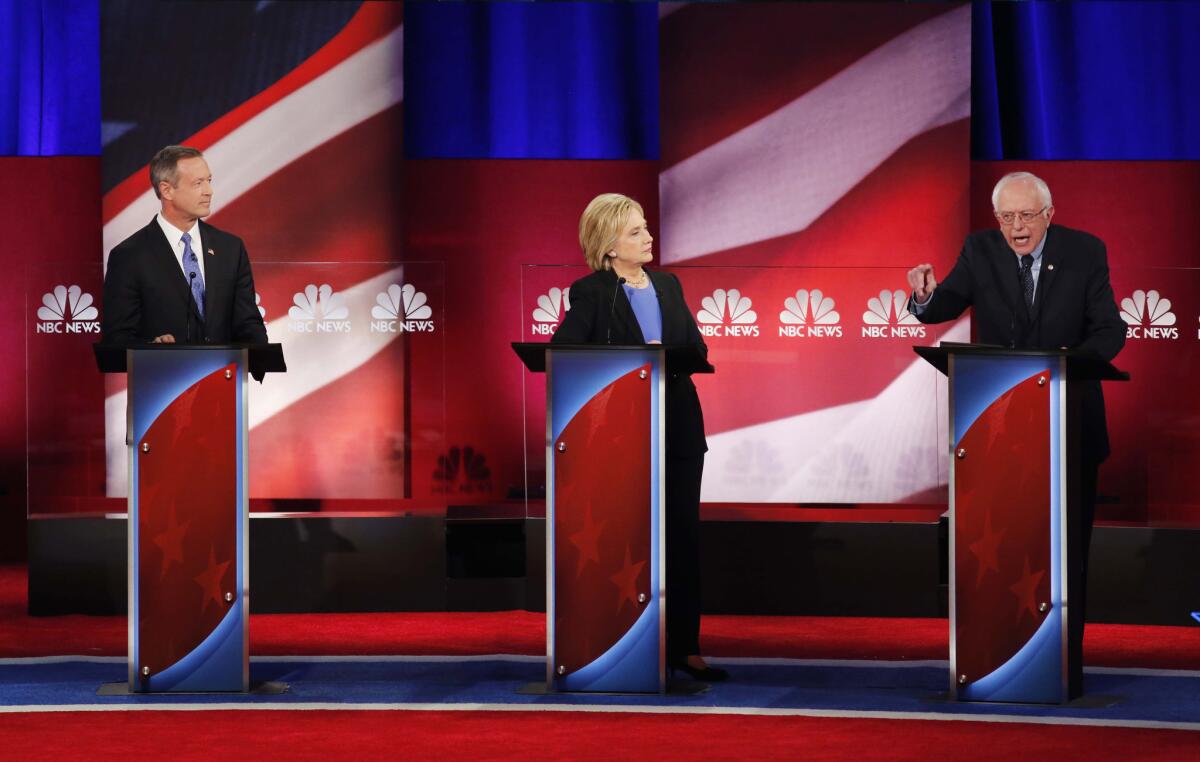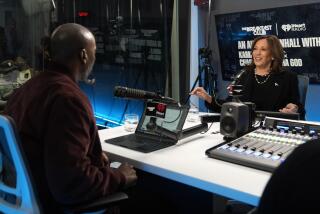In a state still stinging from racial attack, Democrats reach out to black voters

Democratic presidential candidates Martin O’Malley, left, Hillary Clinton and Bernie Sanders debate Sunday night at the Gaillard Center in Charleston, S.C.
Debating less than a block from where nine black parishioners were gunned down in a savage, racially motivated attack, Democratic presidential hopefuls on Sunday zeroed in like never before on a critical pool of support: black voters.
Race and the social ills faced by blacks — in particular black men — was more central to the debate than at any previous gathering among front-runner Hillary Clinton and her rivals for the party’s nomination, Sen. Bernie Sanders of Vermont and former Maryland Gov. Martin O’Malley.
The three Democrats proposed ways to limit gun violence, laid out their views on how to repair relationships between police and the communities they serve, and spoke passionately of trying to create economic opportunities for disenfranchised young black men.
“There needs to be a concerted effort to address the systemic racism in our criminal justice system,” Clinton declared in the debate hosted by the Congressional Black Caucus Institute.
The focus was not surprising given the debate’s proximity to Emanuel AME Church in Charleston, S.C., where a white gunman last June first joined a prayer group and then opened fire.
The tone was in contrast to one just days prior a few miles away in North Charleston, S.C., where seven Republican presidential hopefuls huddled for a debate that including a discussion about the rights of gun owners and later devolved into attacks over Sen. Ted Cruz’s Canadian birth and Donald Trump’s “New York values.”
Unlike in the Democratic debate, no mention was made of Walter Scott, an unarmed black man whose shooting death at the hands of a North Charleston police officer was captured on video last spring. Republicans did, however, make reference to the AME Church shooting.
The difference largely boils down to each party seeking to appeal to its core supporters. Black voters overwhelmingly support Democrats, and Republicans have struggled to make inroads with African Americans while relying on the support of an aging white base.
Join the conversation on Facebook >>
And for Democrats, high turnout among black voters is a key to cobbling together a winning coalition in November. The party is unlikely to replicate the turnout of 2008 and 2012, when the election of Barack Obama as the nation’s first black president brought record numbers of blacks to the polls.
In 2012, for the first time ever, black voter turnout rates exceeded the white voter turnout rate — 66.2% versus 64.1%, according to a Census Bureau report.
Keeping those numbers at similar levels will be a difficult task without Obama on the ticket. Long before November’s election, black voters will be key to deciding who wins the Democratic nomination.
As the race between Clinton and Sanders tightens in the first nominating states of Iowa and New Hampshire — two places where the electorate is overwhelmingly older and white — the former secretary of State is banking on African American voters in South Carolina to be her firewall of sorts, particularly if she loses the first two states.
Seeking to ensure black support in the South and elsewhere, Clinton tried to demonstrate Sunday that she understood the rate of incarceration plaguing black communities.
I want people hear to think what we would be doing if it was one out of three white men -- and very often, the black men are arrested, convicted and incarcerated.
— Hillary Clinton speaking during Sunday’s Democratic debate in Charleston, S.C.
“One out of three African American men may well end up going to prison. That’s the statistic,” Clinton said, citing the Sentencing Project, a Washington, D.C.-based group that advocates for prison reform. “I want people here to think what we would be doing if it was one out of three white men. And very often, the black men are arrested, convicted and incarcerated.”
Clinton, whose husband, former President Bill Clinton, was widely lauded by the black community, has benefited from strong poll numbers among minorities — something Sanders has consistently struggled with in his candidacy.
An NBC News/Wall Street Journal poll released Sunday showed Clinton leading Sanders 69% to 27% among nonwhite primary voters. A Winthrop University poll from last November found that in South Carolina — which will hold its Democratic primary Feb. 27 — 80% of black Democratic voters supported Clinton, compared with 8% for Sanders.
TRAIL GUIDE: All the latest news on the 2016 presidential campaign >>
“It’s certainly Hillary Clinton’s race to lose here in South Carolina,” said Rep. James E. Clyburn (D-S.C.), whose annual political fish fry over the weekend was attended by Sanders, Clinton and O’Malley.
Clyburn, who is remaining neutral in the primary, said in an interview that it’s still early and South Carolina Democrats — in particular black voters — will be watching Iowa and New Hampshire closely.
“Barack Obama winning Iowa in 2008 certainly helped boost his support here,” Clyburn said. “African Americans saw he was appealing to nonblacks and that helped. ... African Americans are not just voting to be voting. We want our vote to be consequential.”
Sanders, who has enlisted prominent philosopher Cornel West and rap artist Killer Mike to court black support, remains undeterred by poll numbers. He notes that when his campaign began last spring he was polling in single digits but is now a contender for the nomination.
“When the African American community becomes familiar with my congressional record and with our agenda, and with our views on the economy and criminal justice — just as the general population has become more supportive, so will the African American community,” he said during Sunday’s debate.
SIGN UP for the free Essential Politics newsletter >>
But some see his time slipping away.
South Carolina House Minority Leader J. Todd Rutherford, the first elected official from the Palmetto State to endorse Obama during the 2008 primary, said Sanders’ message about income inequality resonates with black voters, even though he remains somewhat of an unknown.
“He has a strong message, yet people look at him like, ‘Who is this guy?’” said Rutherford, who has remained neutral in the primary. “At least among older black voters — from what I’ve seen — people just don’t know him. Younger people hear his message, but there’s still skepticism.”
Follow @kurtisalee for political news
ALSO
Hillary Clinton campaign chairman tells super PAC to ‘chill out’
Why Marco Rubio and Chris Christie are hoping to place third in Iowa
Sanders, Clinton clash on guns, healthcare and Obama legacy as Democrats debate
More to Read
Get the L.A. Times Politics newsletter
Deeply reported insights into legislation, politics and policy from Sacramento, Washington and beyond. In your inbox three times per week.
You may occasionally receive promotional content from the Los Angeles Times.











